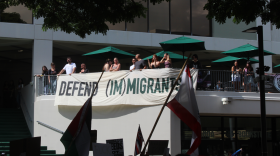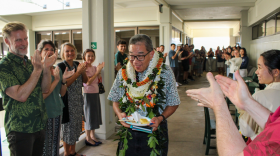The Trump administration has reversed its policies on international student visas. Initially, 4,700 students across the country had their permission to study in the U.S. revoked, including several individuals enrolled at the University of Hawaiʻi.
But Immigration and Customs Enforcement, or ICE, has paused those actions and reinstated visas as of Friday. Whether the about-face is permanent or temporary remains unclear.
Brent White, the chief global officer for the University of Hawaiʻi System, talked with The Conversation prior to the latest turn of events. He explained how the university is trying to help its international students navigate the unpredictable circumstances.
Interview highlights
On the difference between a visa revocation and a Student and Exchange Visitor Information System (SEVIS) termination
BRENT WHITE: A point of clarification, there's a visa revocation, and then there's something called termination of a SEVIS record. So the visa is what gives a student permission to enter the United States, and then they come for the duration of their program, and they're registered in a system called SEVIS. And so it's the SEVIS record that allows them to continue their studies. And so what we're seeing is SEVIS terminations, which could reflect an underlying visa revocation or not. But the important thing for us is the student is registered in SEVIS, which gives them permission to stay in the country and continue their program.
On advice for current and prospective international students
WHITE: The first message is we're here to support you, and you're welcome here at the University of Hawaiʻi. In terms of advice for students, it really depends on a particular circumstance of that student, whether there's a risk to travel home this summer… Looking at that student, do they need a new visa if they go home, or is their current student visa valid to come back? What country would they go home to? What are the visa grant rates in their country? What are the wait times? And then some personal factors. Have you engaged in speech activity that might bring you to the attention of an ICE agent as you come back into the country — what's on your social media? And so we have to give students some very straightforward advice based upon their circumstances.
On the potential for the international student population to decrease at UH Mānoa
WHITE: I did take a look this morning at our numbers, kind of point-in-time, comparing students who've already enrolled for the fall today versus point in time last year. And at UH Mānoa, we're up significantly, about 18%, so we're seeing continued growth. And this is a trend we've seen over the last few years, which is a growing number of international students… In the prior Trump administration, when the rest of the country went down for international students, we actually went up for international students. And I think there's something to that, that this is a place where students do feel safe, and there's a welcoming, safe environment for students, and maybe a little bit removed from what's happening on the continent.
On concerns and fears among international students at UH Mānoa
WHITE: We have 1,700 international students. I don't want to generalize as to what any particular student is feeling. I certainly am sure that some students are nervous, that some students are feeling some anxiety, particularly about traveling home. This summer, we've certainly seen a very large increase in the number of students coming to talk to us about whether or not they should travel home. This summer, we've also seen fewer students seeking a travel signature, because we have to sign their documents in terms of traveling home and coming back. And we've seen fewer students that appear to be planning to travel home this summer. So I think that's some evidence of what's going on. But again, the number of SEVIS record terminations is actually very small. Another thing to note is they've stopped nationwide since April 10. So the last kind of report we've gotten of these kinds of ramifications in any significant number was April 10. I think this is a result of the fact that there have been a number of lawsuits filed on the continent, many of them resulting in TROs against the government and ordering them to reinstate the SEVIS record for the students involved in those lawsuits. And so I think after a series of losses, the government has stopped, hopefully completely, hopefully not just a pause. So I think it's possible to overstate the danger of students as well. And I think it's important that we not do that. The majority of our students are safe, the majority of the students are fine, and I think hopefully some students can take some comfort in that.

This interview aired on The Conversation on April 28, 2025. The Conversation airs weekdays at 11 a.m.
Hawaiʻi Public Radio exists to serve all of Hawai‘i, and it's the people of Hawai‘i who keep us independent and strong. Help keep us strong to serve you in the future. Donate today.






